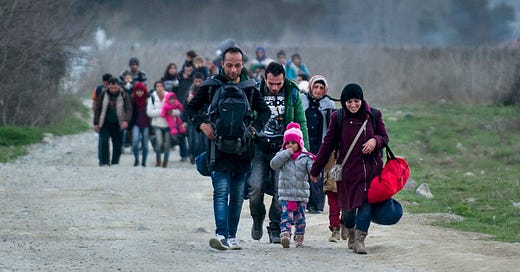Syria’s strategic and moral test for America’s foreign policy
Access to food and medical aid for millions of Syrians are at stake – why getting results on this issue matters for Biden’s broader foreign policy agenda
June 2021 saw a number of important events happen in U.S. foreign policy – President Biden’s first trip overseas, the latest conflict between Israel and Hamas, and some small but important steps on the global pandemic front.
A quick look over the horizon finds a key action point for the Biden administration on an issue that intersects with most of the broad themes the Biden administration has laid out for the country: humanitarian aid to Syria.
At midnight on July 10, a six-month mandate for keeping a border crossing open to deliver humanitarian aid to millions of Syrians living in the northwest part of the country controlled by rebels will expire. The United Nations Security Council will vote on a resolution on whether to allow UN convoys of aid across a single border crossing on Turkey’s border into Syria.
Russia has threatened to veto the resolution and close off cross-border aid – it backs the Bashar Assad regime’s efforts to reimpose its sovereignty through the use of force that has killed hundreds of thousands of Syrians and displaced millions. The worry is that cutting off these cross-border aid deliveries will give the Assad regime more power to use access to food to ordinary people as leverage. On a visit to Turkey earlier this month, US Ambassador to the UN Linda Thomas-Greenfield said without this border crossing open, “people will die.”
Why does this issue on the other side of the world matter here in America? Given all that’s going on at home and the other priorities overseas like climate change, the coronavirus, and China, why does Syria matter?
When historians look back on the unraveling of the international system in the opening decades of the twenty-first century, Syria’s war will be seen as a key point in the fracturing of the international system. The ongoing war continues to have broad, negative spillover effects around the globe. As Anne Barnard of the New York Times argued a few years ago, the ongoing war has resulted in an international system paralyzed in the face of atrocities, a flood of refugees, and a rise of nativist, gated community politics in Europe and America.
Those impacts still exist today, and the Biden administration has diagnosed the broader situation in a series of speeches and interim national security guidance that identify the challenges in the world.
Syria is important for U.S. foreign policy on five fronts:
1. Winning the competition between democracies versus autocracies – The Biden administration has defined a key part of its foreign policy agenda as showing the democracies can deliver and compete against authoritarian governments. Syria, backed by autocratic governments in Russia and Iran, has shifted the goal posts on freedom in the world through its actions on the ground against its own people.
2. Elevating human rights – Linked to the democracy agenda, the values agenda outlined by the Biden administration is challenged by the daily atrocities and ongoing mechanized murder of Syrians by the government in Damascus.
3. Putting diplomacy first – “America is back” is a mantra Biden administration officials often repeat, and it has worked to prioritize diplomacy in U.S. national security policy tools. Biden’s trip to Europe and the meeting with Russia’s President Vladimir Putin focused on the theme of engagement getting results, and this specific aspect of Syria policy on cross-border aid is an important test of whether diplomacy can achieve the goals stated by the Biden administration.
4. Competing with Russia and China – Another important theme of Biden’s foreign policy is making competition with Russia and China a priority. In Syria, both countries have backed the Assad regime’s actions and have vetoed 16 resolutions at the United Nations related to the Syrian conflict.
5. Defining America’s approach to the broader Middle East – Syria is a vortex that has drawn in many key countries in the Middle East, including Iran, Israel, Turkey, and several Gulf states. By staking out a diplomatic position on this one aspect of Syria policy, cross-border humanitarian aid, the Biden administration has set a marker. If Russia and other countries call America’s bluff, and it has no plan B to address the consequences, it would send a clear signal about whether America is committed to achieving the outcomes it sets.
In the summer of 2011, President Barack Obama declared that Syria’s President Assad must go. But Assad outlasted two U.S. presidents, and with support from Russia and Iran, thumbed its nose at the international community.
U.S. policy on Syria is one of the thorniest foreign policy challenges the country faces, and there are no easy solutions to the many problems there. But this question of cross-border humanitarian aid has presented the Biden administration with an opportunity to demonstrate that a “diplomacy first” policy seeking to elevate human rights and compete against authoritarian countries like Syria and Russia can deliver results. The next few weeks will offer a clear sign of whether this approach will bear fruit.





